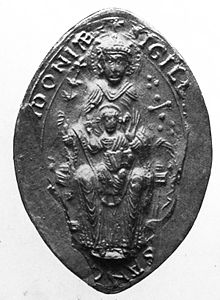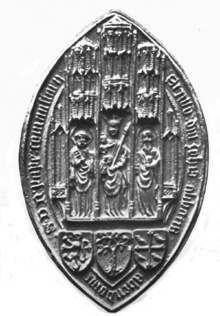Abbot of Abingdon
The Abbot of Abingdon was the head (or abbot) of Anglo-Saxon and eventually Benedictine house of Abingdon Abbey at Abingdon-on-Thames in northern Berkshire (present-day Oxfordshire), England.
The following is a list of abbots of Abingdon:
Fictional abbots
Historian Susan E. Kelly regards the traditional first six abbots as fictional: "There is good reason to think that in most cases their names were simply plucked from early charters available in the abbey's archive, the majority of which would seem to have had no connection with an early minister at Abingdon; there is no very convincing evidence that the historians had access to independent, reliable sources of information. The 'history' of the pre-Æthelwoldian minister seems to a very large extent to represent a fictional reconstruction".[1]
Probably fictional abbots:
| Name | Comments |
|---|---|
| Hæha, also Hean | The legendary first abbot of Abingdon, but, according to Kelly, more probably an abbot of Bradfield, his name having been plucked from a charter dated 704,[2] with others, in order to replace the lost early history of Abingdon Abbey.[1] |
| Cumma | Cumma is mentioned in a forged charter of King Æthelbald,[3] but "no Abbot Cumma is known from other sources".[1] It is, however, generally considered that the village of Cumnor is named after him. |
| Hræthhun | A Hræthhun was styled abbot of Abingdon in a charter dated 811,[4] but the charter was forged, probably using the name of Hræthhun (d. 839/40), bishop of Leicester. Kelly therefore excludes him from the list of Abingdon abbots.[1] |
| Alhhard | Kelly suggests that the name was plucked from the witness list of a charter,[5] with others, in order to reconstruct the lost early history of the Abbey of Abingdon.[1] |
| Cynath | A Cynath, abbot of Evesham, mistakenly listed by the compiler of the De Abbatibus Abbendoniae as an abbot of Abingdon.[1] |
| Godescealc | Godescealc's name occurs in three charters, all of them forgeries, and was later extracted from these documents and used in the construction of a spurious early history of the Abbey of Abingdon.[1] |
Abbots


The historic abbots, right up to the dissolution of the abbey in 1538, are as follows:
| Name | In office | Comments |
|---|---|---|
| Saint Æthelwold of Winchester | c. 955 – c. 964 | later Bishop of Winchester[1] |
| Osgar | c. 964 – 984 | [1] |
| Eadwine | 985 – 990 | [1] |
| Wulfgar | 990 – 1016 | [1] |
| Æthelsige | 1016 – 1018 | [1] |
| Æthelwine | 1018 – 1030 | [1] |
| Siward | 1030 – 1044 | [1] |
| Æthelstan | c. 1044 – 1047/1048 | [1] |
| Spearhafoc | c. 1047/1048 – 1051 | a famous goldsmith, later Bishop-Elect of London, who absconded with a large treasure |
| Rodulf | 1051 – 1052 | [1] |
| Ordric | 1052 – 1066 | [1] |
| Ealdred | 1066 – 1071 | [1] |
| Adelelm | 1071 – 1083 | Norman abbot[1] |
| Rainald | 1084 – 1097 | Norman abbot[1] |
| Faritius | 1100 – 1117 | Norman abbot[1] |
| vacant | 1117 – 1121 | [6] |
| Vincent | 1121 – 1130 | [6] |
| Ingulph | 1130 – 1159 | [6] |
| Walkelin | 1159 – 1164 | [6] |
| vacant | 1164 – 1165 | held by the king[6] |
| none | 1165 – 1175 | held in commendam by Godfrey, bishop of St Asaph[6] |
| vacant | 1175 | [6] |
| Roger | 1175 – 1185 | [6] |
| vacant | 1185 – 1186 | vacant for half a year[6] |
| Alvred | 1186 – 1189 | [6] |
| Hugh | 1189/1190 – c. 1221 | [6][7] |
| Robert of Hendred (Henreth) | 1221 – 1234 | [7] |
| Luke | 1234 – 1241? | [7] |
| John de Blosmeville | 1241 – 1256 | [7] |
| William of Newbury | 1256 – 1260 | [7] |
| Henry of Frilford (Frilleford) | 1260 – 1261 | [7] |
| Robert of Hendred | 1261 – 1289 | [7] |
| Nicholas of Culham | 1289 – 1306 | [7] |
| Richard of Bishops Cleeve | 1306 – 1315 | [7] |
| John of Sutton | 1315 – 1322 | [7] |
| John de Canyng (Canynges) | 1322 – 1328 | [7] |
| Robert of Garford | 1328 – 1332 | [7] |
| William (of Cumnor (Comenor(e)) | 1332 – 1335 | [7] |
| Roger of Thame (Tame) | 1335 – 1361 | [7] |
| Peter of Hanney | 1361 – 1399 | [7] |
| Richard de Salford | 1401 | [8] |
| John Dorset | 1415 | [8] |
| Richard Boxore | 1421/2 – 1427 | [8] |
| Thomas Salford | 1427 | [8] |
| Ralph Hamme | 1428 – 1435 | [8] |
| William Ashendon | 1435 | [8] |
| John Sante | 1468 | [8] |
| Thomas Rowland | 1496 | [8] |
| Alexander Shottisbrook | 1504 | [8] |
| John Coventry | 1508 | [8] |
| Thomas Pentecost (= Rowland) | 1511/1512 – 1538 | [8] |
Notes
- ^ a b c d e f g h i j k l m n o p q r s t u Kelly, Charters of Abingdon, part 1
- ^ S 245
- ^ S 93
- ^ S 166
- ^ S 1201
- ^ a b c d e f g h i j k Knowles, Brooke and London (2001), The heads of religious houses: England & Wales, I. 940–1216, pp. 24-5.
- ^ a b c d e f g h i j k l m n o Smith and London (2001), The heads of religious houses: England & Wales, II. 1216–1377, pp. 16-8.
- ^ a b c d e f g h i j k Ditchfield and Page, ed, Victoria History of Berkshire, pp. 57-62.
References
- Ditchfield, P. H.; William Page, eds. (1907). Victoria History of Berkshire. Vol. 2. London: Constable & Co.
- Kelly, Susan E. (2000). Charters of Abingdon, part 1. Anglo-Saxon Charters 7. Oxford: Oxford University Press.
- Knowles, David; C. N. L. Brooke; Vera C. M. London, eds. (2001). The Heads of Religious Houses: England & Wales, I. 940–1216 (2nd ed.). Cambridge: Cambridge University Press.
- Smith, David M.; Vera C. M. London, eds. (2001). The Heads of Religious Houses: England & Wales, II. 1216–1377. Cambridge: Cambridge University Press.
